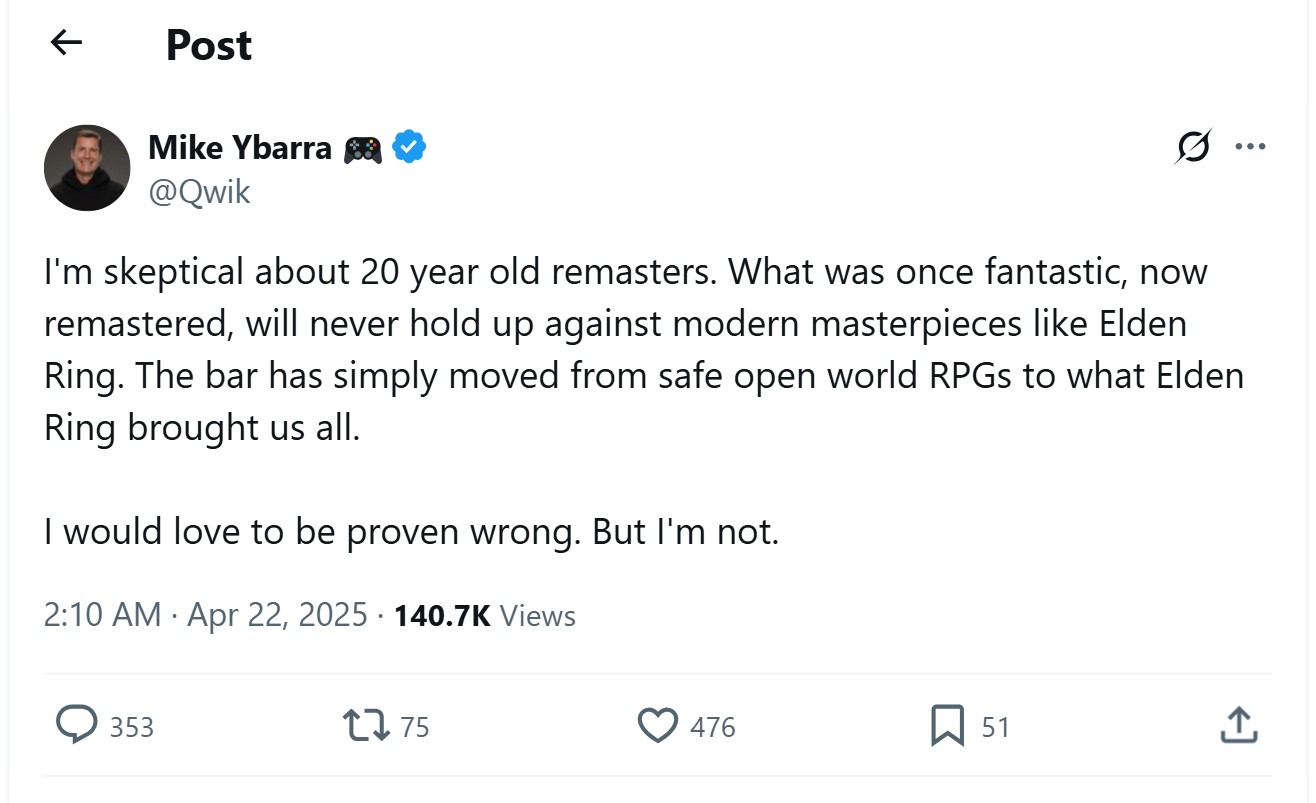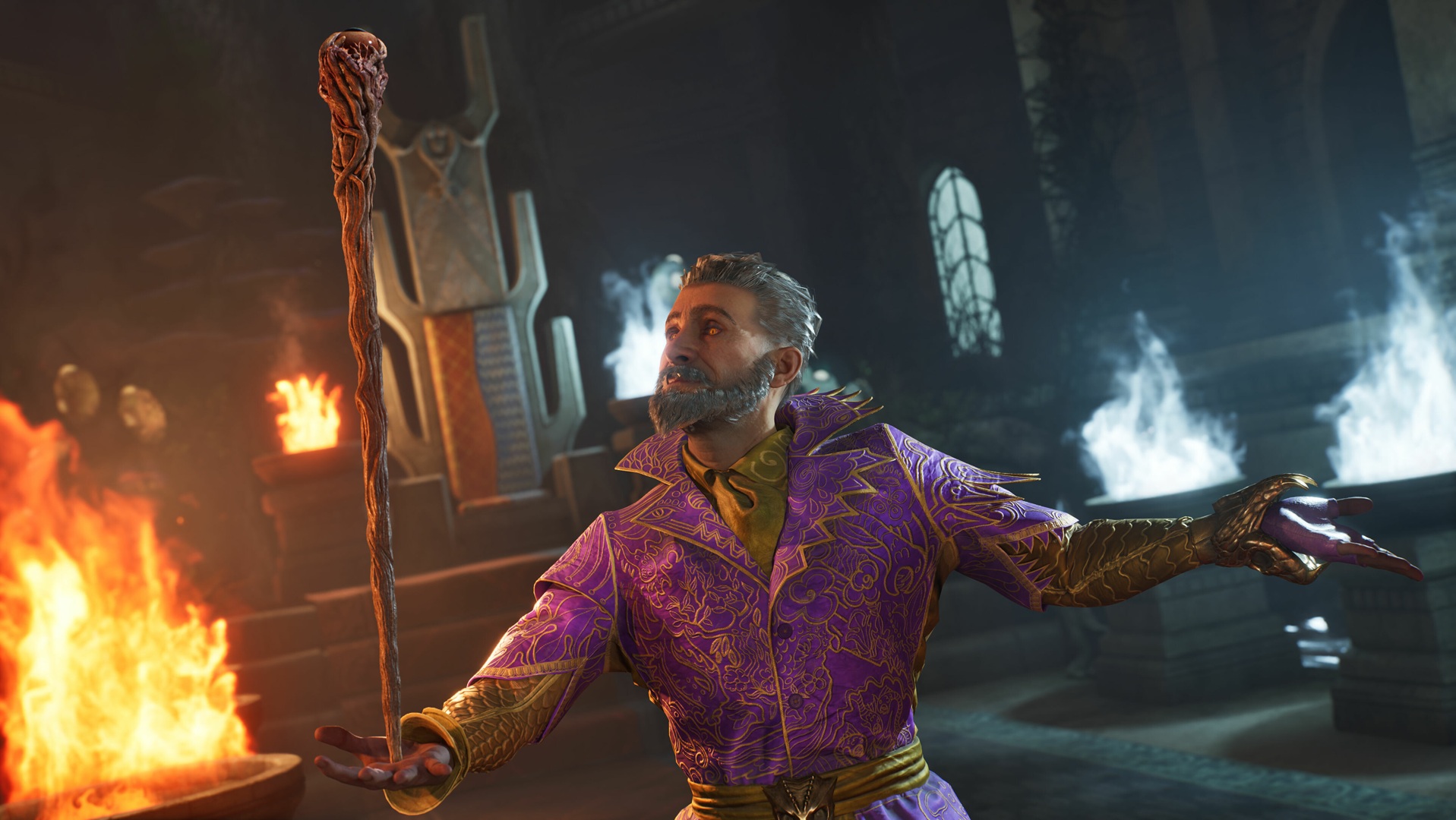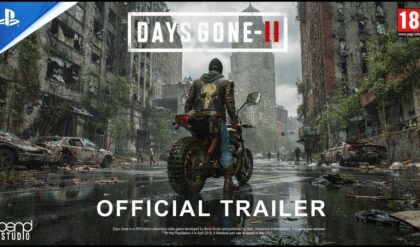Ex-Blizzard Boss Sparks Heated Debate by Questioning Oblivion Remastered’s Place in a World Dominated by RPG Giants Like Elden Ring—Uncover Why This Controversy Is Igniting the Gaming Community!
On April 22, 2025, the gaming world was set alight with the surprise release of The Elder Scrolls IV: Oblivion Remastered, a visually overhauled version of Bethesda’s 2006 RPG classic. The shadow-dropped title, available on PC, PS5, Xbox Series X/S, and Game Pass, skyrocketed to the top of Steam’s sales charts, peaking at 182,298 concurrent players within hours. Yet, amidst the fanfare, former Blizzard president Mike Ybarra stirred controversy with a bold critique, arguing that 20-year-old remasters like Oblivion cannot compete with modern RPG masterpieces such as Elden Ring. His comments, shared on X, have sparked a fierce debate about nostalgia, innovation, and the evolving standards of open-world RPGs. As players dive into Cyrodiil’s refreshed landscapes, Ybarra’s skepticism raises critical questions about the role of remasters in today’s gaming landscape. Here’s a deep dive into the controversy, the remaster’s reception, and why it’s dividing fans and industry veterans alike.
Ybarra’s Critique: A Clash of Eras
Mike Ybarra, who served as Blizzard president from 2021 to 2024, took to X to express doubts about Oblivion Remastered’s relevance. “I’m skeptical about 20-year-old remasters,” he wrote. “What was once fantastic, now remastered, will never hold up against modern masterpieces like Elden Ring. The bar has simply moved from safe open-world RPGs to what Elden Ring brought us all. I would love to be proven wrong. But I’m not.” Ybarra clarified that his comparison wasn’t about Elden Ring’s Soulslike difficulty but its advancements in “discovery, classes, [and] combat system,” which he sees as setting a new benchmark for RPGs. He also suggested that nostalgia’s appeal is waning, with gamers craving “fresh and new” experiences over recycled classics.

Ybarra’s comments come at a time when Oblivion Remastered has been warmly received. Developed by Bethesda and Virtuos over four years, the remaster boasts Unreal Engine 5 visuals, real-time lighting, redesigned character models, and an overhauled leveling system inspired by Skyrim. Despite its $50 price tag, the game topped Steam’s global sales charts and earned 83% positive reviews from nearly 4,000 Steam users, with PlayStation Store ratings averaging 4.93/5 from 6,500 votes. Fans have praised its balance of nostalgia and modernization, with quirky elements like the original’s janky voice lines and “charmingly ugly” NPCs preserved. Yet, Ybarra’s critique resonates with a segment of players who argue that remasters, no matter how polished, struggle to match the innovation of titles like Elden Ring or The Legend of Zelda: Breath of the Wild.
Oblivion Remastered: A Nostalgic Triumph or Outdated Relic?
Originally released in 2006, The Elder Scrolls IV: Oblivion was a landmark RPG, lauded for its expansive world, freeform gameplay, and vibrant depiction of Cyrodiil. It earned a 93% from PC Gamer and was a defining title of the Xbox 360 era, introducing many to the Elder Scrolls series. However, its age posed challenges: PC players needed community patches to fix bugs, and console players were limited to the Xbox 360 version. The remaster addresses these issues, offering cross-platform availability, enhanced graphics, and refined mechanics like a less rigid leveling system. It retains the original’s quests, voice acting, and quirks, ensuring the “Oblivion experience” remains intact for veterans and newcomers.
The remaster’s success is undeniable. Within six hours of its April 22 launch, it hit 150,000 concurrent Steam players, outpacing recent RPGs like Dragon Age: The Veilguard. Its shadow-drop strategy, despite leaks, fueled excitement, with fans on X calling it “a love letter to Elder Scrolls devotees.” For younger players who discovered the series through Skyrim in 2011, the remaster offers a modernized entry into a classic, as noted by GamesRadar’s Matt Killeen, who sees it appealing to those who missed Oblivion’s original run. IGN’s Ryan McCaffrey, who reviewed Oblivion in 2006, expressed envy for new players experiencing Cyrodiil’s “fully realized medieval fantasy world” for the first time.
Yet, Ybarra’s skepticism isn’t without merit. Oblivion’s combat, often criticized for feeling clunky, remains largely unchanged, and its quest design, while charming, lacks the dynamic reactivity of modern RPGs. Elden Ring, released in 2022, redefined open-world RPGs with its seamless exploration, intricate combat, and non-linear storytelling, earning universal acclaim as a “modern masterpiece.” Ybarra argues that such titles have raised expectations, making “safe” remasters feel dated by comparison. He’s not alone—some X posts echo his view, with users arguing that Oblivion’s “janky” mechanics can’t match Elden Ring’s polish.
The Nostalgia Debate: Remasters vs. Innovation
Ybarra’s critique extends beyond Oblivion to the broader trend of remasters. He suggests that the gaming industry’s reliance on nostalgia—evident in releases like Diablo II: Resurrected (where Ybarra himself was involved)—may be losing steam. “I think we’ve had so many ‘remasters’ that nostalgia is limited,” he wrote, advocating for a full remake over a remaster to truly modernize Oblivion. This stance has drawn pushback, particularly given his role in Diablo II: Resurrected, a 2021 remaster of a 21-year-old game that was well-received. Critics on X have called his comments “hypocritical,” with one user joking, “Who’s gonna tell him he’s in the credits for a remaster?”
The counterargument, voiced by fans and developers, is that remasters serve a dual purpose: preserving classics for new audiences and satisfying nostalgia for veterans. Larian Studios’ Michael Douse, publishing director for Baldur’s Gate 3, indirectly rebuked Ybarra, stating, “These auld execs gotta support the probable GOTY contenders… AAA is feeling more and more disconnected from the audience zeitgeist.” Douse’s comment suggests that Oblivion Remastered’s success—driven by fan demand—reflects a market for both innovation and nostalgia. Players on X, like @RyanW_CFC, have called Ybarra “out of touch,” noting that fans have “clamored for an Oblivion remaster for years.”
Data supports the remaster’s appeal. Its 125GB file size and $50 price haven’t deterred buyers, with SteamDB ranking it fourth in concurrent players within 24 hours of launch. The remaster’s quirks, like random crashes, have been embraced by fans as “just like I remember it,” highlighting nostalgia’s enduring power. Meanwhile, rumors of a Nintendo Switch 2 port suggest Bethesda sees long-term potential. However, critics like PC Gamer’s Andy Chalk argue that Oblivion’s hype may stem from desperation for new Elder Scrolls content, with The Elder Scrolls VI still years away.

Elden Ring’s Shadow: A Fair Comparison?
Ybarra’s choice of Elden Ring as a benchmark has sparked debate about whether the comparison is apt. Elden Ring, developed by FromSoftware, is a 2022 open-world RPG celebrated for its challenging combat, intricate world design, and sense of discovery. It’s a far cry from Oblivion’s accessible, quest-heavy structure, which prioritizes role-playing freedom over punishing difficulty. As one X user put it, “Comparing Oblivion to Elden Ring is like comparing an auto sim to a slasher—different beasts.” TheGamer’s Joshua Robertson argued that players seek Oblivion for nostalgia and comfort, not to chase Elden Ring’s cutting-edge innovation.
Still, Ybarra’s point about evolving standards resonates. Elden Ring, alongside titles like Breath of the Wild and Kingdom Come: Deliverance II, has pushed open-world RPGs toward greater interactivity and immersion. Oblivion’s remaster, while visually impressive, doesn’t overhaul its dated mechanics, potentially alienating players accustomed to modern fluidity. Yet, its commercial success and fan adoration suggest that nostalgia and accessibility remain powerful draws, especially for a generation that missed Oblivion’s original run.
The Future of Remasters
The Oblivion Remastered controversy underscores a broader tension in gaming: balancing reverence for classics with the demand for innovation. Ybarra’s skepticism reflects a push for new IPs and groundbreaking mechanics, but the remaster’s triumph proves there’s room for both. Bethesda’s decision to shadow-drop Oblivion—and its immediate chart-topping success—shows that well-executed remasters can captivate audiences, particularly when modernizing accessibility for new platforms. With The Elder Scrolls VI likely years away, Oblivion Remastered fills a gap, keeping the franchise alive.
As the debate rages on X, with fans defending Oblivion’s legacy and others echoing Ybarra’s call for freshness, one thing is clear: Oblivion Remastered has reignited passion for a 19-year-old classic. Whether it “holds up” to Elden Ring may be beside the point—its role is to bridge past and present, not to outshine today’s giants. As players explore Cyrodiil anew, Ybarra’s challenge to “prove him wrong” seems to have been met, at least for now.





